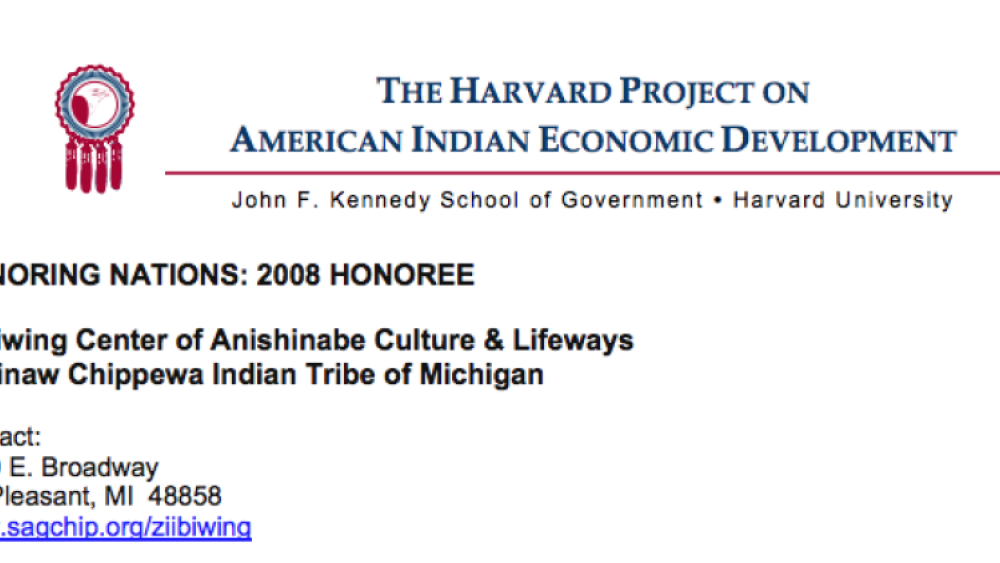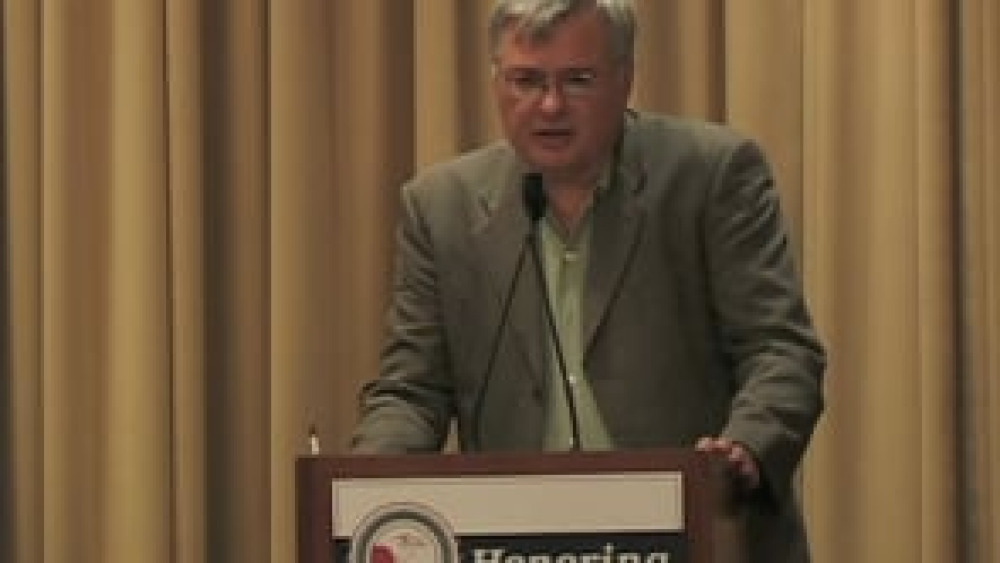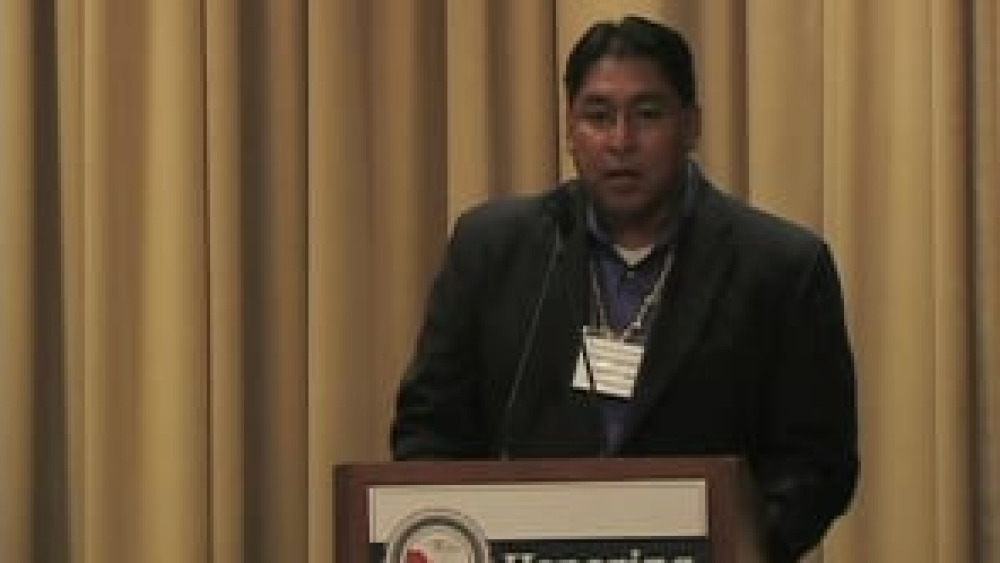Ziibiwing Center of Anishinabe Culture & Lifeways Director Shannon Martin presents a history of the Ziibiwing Center and discusses the work it has been engaged in since it won an Honoring Nations award in 2006.
Additional Information
Martin, Shannon. "Ziibiwing Center of Anishinabe Culture and Lifeways." Honoring Nations symposium. Harvard Project on American Indian Economic Development, John F. Kennedy School of Government, Harvard University. Cambridge, Massachusetts. September 18, 2009. Presentation.
Transcript
"[Anishinaabe language]. I'd like to acknowledge, first and foremost, this land and the tribes that reside here and the ancestors of those tribes as we gather here and we bring all of our hopes and our blood memories and our ancestral peoples here to this symposium -- this wonderful opportunity that was provided to us by the Honoring Nations and Harvard Project staff.
So with that, my name is Shannon Martin and I'm the current Director of the Ziibiwing Center of Anishinaabe Culture & Lifeways. We are a tribally owned and operated cultural center and museum that belongs to the Saginaw Chippewa Indian Tribe of Michigan. Our project started through a grassroots initiative that was based upon addressing the newly enacted Native American Graves Protection and Repatriation Act [NAGPRA]. And through that grassroots effort, a small cultural society was formed by those originating members. That cultural society was termed the Ziibiwing Cultural Society. Ziibiwing in our language means 'by or near the water.' And it was named to represent a historical gathering place of the Saginaw Chippewa of the region, there in central Michigan.
But through that work, the Ziibiwing Cultural Society began to identify repositories of tribal proceedings and treaties and other historical documents that were languishing in the basements and attics of former tribal council members and chiefs and leaders. So congruently, the work to address the stacks of inventories and of information of, items of cultural patrimony; those summaries were stacking up in the tribal government offices. The Ziibiwing Cultural Society began to address those inventories and [came] up with a plan to begin working towards bringing home ancestors through repatriation and disposition, and then also distinguishing that place to be the repository for the tribal archives and the tribal collections and treasures.
So from that humble grassroots beginning, the Ziibiwing Cultural Center of Anishinaabe Culture & Lifeways emerged and we opened our doors in May of 2004. So we have a short term of being a tribal museum. And we learned from some other established tribal museums and acknowledging their work and their reciprocity in sharing their information with us. In doing this work, Honoring Nations again provided us with those opportunities to create tools so that we can in turn be reciprocal and redistribute the information that we've acquired and best practice and what we've learned. So in that way, [Anishinaabe Language], the Harvard Project and Honoring Nations, for the privilege of being here today. In this presentation, I would like to focus on the work that we have been doing post-honors award.
At this exact moment, there's members of the Ziibiwing Center team who are mitigating the desecration of an ancestral burial ground in downtown Flint, Michigan. This sacred site was disturbed by construction activity in January of 2008. So this unfortunate situation has been complex at every turn -- from January 2008 when the [inadvertent] discovery took place -- we have come to find out. Through a series of meetings with the landholders -- who are a non-profit organization, an urban rehabilitation housing organization called the Genesee County Land Bank. We've been present at these meetings since that discovery with their representatives as well as the City of Flint -- because they were working in concert with the City of Flint. So we're sitting through a series of meetings, from January 2008 until this past spring, trying to come up with a mitigation plan and a resolution to the situation.
So in working through those complexities, our team discovered that there was negligence at many levels -- negligence that was taking place from the first assessment of the site, in which -- historic preservation letters are supposed to be sent to all of the federally recognized and state historic tribes in Michigan. These letters never made it to our offices. So there was some negligence going on between the federal agency, who is HUD [U.S. Department of Housing and Urban Development]. They were providing some funding towards this rehabilitation project. They designated the City of Flint to be the federal designee and to do the work and be the contact. So between the City of Flint and the Genesee County Land Bank, fingers were being pointed at each other as to the mystery of where these historic preservation letters somehow vanished to. So with that, we came in at that point when the damage had already been done. And then the following consequences of that were that essentially, the Genesee Count Land Bank and the City of Flint expressed that they do not have, did not have the funding to mitigate the situation.
So these talks have been continuing since then and finally, this summer we have come to a proposal and a resolution. But the tribal council from the Saginaw Chippewa tribe has been actively involved in this situation since the get go. They supported the Ziibiwing Center team in letting us go down there to assess the situation when it first happened. And in an unprecedented event in their tribal history, the tribal council issued a cease-and-desist order that they presented to the Genesee County Land Bank in the City of Flint and which -- they honored that cease-and-desist order even though the tribe had no jurisdiction there. It was within the tribal historic territory but, with no jurisdiction, they still honored that cease-and-desist order to stop all construction activity at that site as we were having these talks, meetings and negotiations to mitigate the situation.
So on June 2, 2009, the Genesee County Land Bank and the tribe agreed to a mitigation proposal. That proposal essentially stated that the tribe would assume responsibility of coordinating this recovery and reburial effort, including incurring the cost to do this. So it was, the tribe was at these discussions, these negotiation tables, and the Genesee County Land Bank just wanted to bulldoze all of the dirt piles back into the ground and cover it up and reseed it. But through our assessment we just couldn't let that happen. Our team met with tribal attorneys, we met with the tribal council, we sought advisement from tribal elders. Because of the state of the situation, splintered ancestral remains and fragments were scattered throughout all of this dirt that was pulled from the earth. So mixed in with that, with our ancestors, was modern day garbage, trash, broken glass, old housing debris from the original structures that they raised and just an assortment of, what we've coined at the site as, 'Euro-trash.' So in doing that we didn't want to, we couldn't allow them to push the earth back in. So in that instance, we jumped into action and began to outline that proposal to mitigate the situation and tribal council voted on June 2 to advance that mitigation proposal. The Genesee County Land Bank and the City of Flint agreed to the proposal and we began to put into place, through a short time frame, a window of opportunity, the Ziibiwing Center was tasked, by the tribal council, to coordinate this effort.
So we began the recovery process on August 13. And through that recovery effort we are doing it at a low cost as possible; it's powered by volunteers, who are coming to the site daily to assist us. And then we have consultants on site; so we do have a credentialed archaeologist who's working with us on site to monitor the work and to provide the basic archaeological skill sets to begin sifting, for volunteers to sift, through the dirt. So we're looking at over 76,000 cubic feet of dirt that was pulled from the earth in four dugout basement sites; so it spans a city block. But there are four sites that we need to address. Splintered ancestral remains were, we have assessed that they're in every dirt pile, so we have to carefully sift through those piles and respectfully separate those ancestors from the rest of the unassociated debris. So the monitoring by the archaeologists and by field supervisors -- these individuals have stepped forward to provide that necessary expertise to us. They've been working in concert with us since this discovery and they are foregoing some of their own family and personal and professional obligations to help us and being at that site about six days a week that we are currently operating this recovery effort.
So in doing our work at the Ziibiwing Center, it can best be summed up by this quote. It's a quote from over 100 years ago that really resonates with our team. And this was penned by a journalist who was in Chicago by the name of Finley Peter Dunn when describing the purpose of newspapers. He said, 'In that work we must comfort the afflicted and afflict the comfortable.' And at Ziibiwing we love to afflict the comfortable. The Flint ancestral recovery effort is doing just that. We are shaking the hallowed halls of various academies throughout Michigan, and I'm sure throughout the Great Lakes region, because this effort is beginning to attract statewide and national attention.
So in that, we are kind of being a lightning rod for unsolicited criticism and paternalistic overtures of assistance from professionals in the field -- archaeologists who would just love to come in and provide the necessary monitoring consultations with the end result that they get to take the goods home, the goods back to their university. So we're not letting that happen. Then the criticism comes and they're telling their colleagues in the 'Academy' that they should just bulldoze it back in. So that's their recommendation, since they can't be there to do the work the way that we want the work to be done. Now they're saying, on the flip side, that it should just be bulldozed back in with all the associated debris and contents. So in that work we're dealing with the criticisms and trying to shield as well the archaeologists and the graduate students who are working with us. One of the graduate students in a Saginaw Chippewa tribal member and he's at Michigan State University -- and his wife Nicole is also a graduate student there, too -- and they're our primary field supervisors. But they are catching a lot of flack, as well as the archaeologists; there's three archaeologists working with us. The Academy is criticizing their work; they're rogues. All sorts of attachments have been given to them and now they're seemingly being outcast within their own profession. And some of their colleagues have even called them up and said, 'Being a part of this project and working with the Saginaw Chippewa you are essentially ruining your professional reputation.' So we're working through those issues as well.
The Genesee County Land Bank, upon this mitigation proposal when we've completed what we need to do there, they would like to donate this land to the Saginaw Chippewa Indian Tribe of Michigan. So once we've recovered the ancestors -- reburied them and restored the land to meet our needs or to suit our protocols -- the tribe can then oversee and manage the land and take title of it so that that area can never be disturbed again.
And finally, the project is contributing to the tribal community in accomplishing cultural capacity and kinship building. Tribal members are being drawn to the site and are assisting daily. Many of whom expressed that they felt a need to be there, they just had to be there, they said. All ages of tribal members are working with us on this project. And this is the first time that many of them have expressed that they have wanted to be actively engaged within their own community, their own tribal community. One grandma who travels with us -- our staff -- almost daily, she said that she never really felt like she fit in her tribal community until this project. She works in the elements and in the hot sun with us carefully sifting and finding and recovering our ancestors.
I also have to acknowledge clients. We have -- the Ziibiwing Center has a strong relationship with the residential treatment center and the behavior health program. We've developed some curriculum based on the permanent exhibition within the center and we work with those clients once a week. Well, now that work has taken new life through this project. In that, the residential treatment center clients travel down to the Flint site about twice a week to assist in this effort. And they have said that working there, taking care of the ancestors, doing the physical labor, practicing spiritual protocols at the site has strengthened their road to recovery and has provided them with more spiritual connection to one another and to their own heritage.
So with that, that's the most pressing work, at this point, that the Ziibiwing Center has been doing since our honors award. I'd like to also mention some other defining moments in our work that includes the successful transfer, which will be taking place of culturally identifiable human remains. That claim was jointly done in May, this past May, with Central Michigan University in Portland, Oregon. So we are going to be bringing home 144 minimum number of individuals and 350 associated funerary objects that will be reburied on tribal land in the ancestral cemetery. We were also awarded an Institute of Museum and Library Services, Native American Native Hawaiian Museum Services grant for fiscal year 2010 to develop our disaster and emergency preparedness plan so that we have those systems in place to protect the tribal treasures and to protect our human resources and visitor-ship. And then just a few days ago we were notified that we were awarded an award through the Tribal Archives Libraries and Museums for Institutional Excellence in Museums, which we'll pick that award up next month.
Other work that we're doing on a local level, working again with behavioral health, is that we're going to begin looking at developing curriculum that addresses domestic violence as well as Two Spirit history and identity. Many clients have expressed that their addictions and their struggle in their lifetime is due to identity issues. So we're going to help provide the context for that history and provide curriculum to behavioral health in that effort and we'll start instilling that history and that pride back into the community because of the imposition of, as we know, the colonizer and our views on that today.
I'd like to close by saying Miigwetch, first and foremost, to an old friend who's on staff, Misko Beaudrie. She was able to connect Audrey and I yesterday afternoon to members of staff at the Peabody Museum. And Sandra's here. Audrey and I met with Sandra and Diana this morning to begin talks of repatriation for nine ancestors that are currently housed here at the Peabody and their associated funerary objects so we're going to be putting together that road map and put that in place. We'd like to acknowledge the Peabody staff for making time for us this morning, so that we can begin those relationships here at Harvard and bring home our ancestors from this area that were taken.
So as we work together to repatriate those ancestors, our work still continues on being a place that comforts the afflicted in addressing multi-generational historical trauma, through exercising our cultural and spiritual sovereignty. And our work will also continue in afflicting the comfortable. So presenting our history, presenting our culture, protecting our intellectual and cultural property and infusing it all with our spiritual life ways, again on our terms -- just seems to really afflict those who like to rewrite our history and tell us how we should be.
So Miigwetch to Honoring Nations for this recognition and this privilege for being here and to spend time with all of you these past few days. Audrey and I have just been commenting and talking about all the inspiring things that we've learned while we've been here. If you can, we have a few copies of this product, which was a direct result of our Honoring Nations award. We were able to publish and distribute a four-year report. In the words of the Video Professor, try my product."



